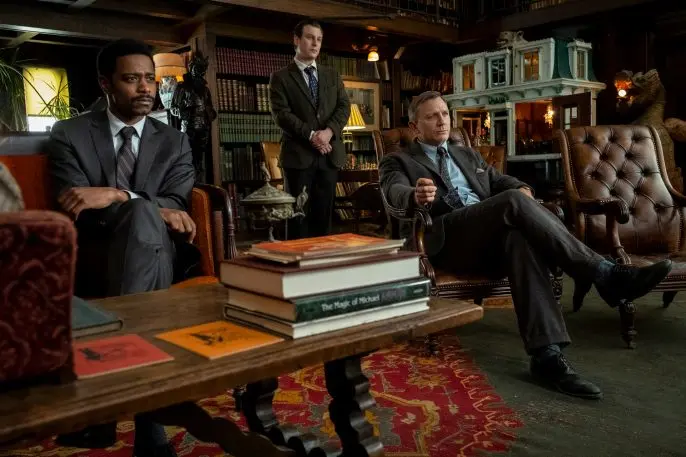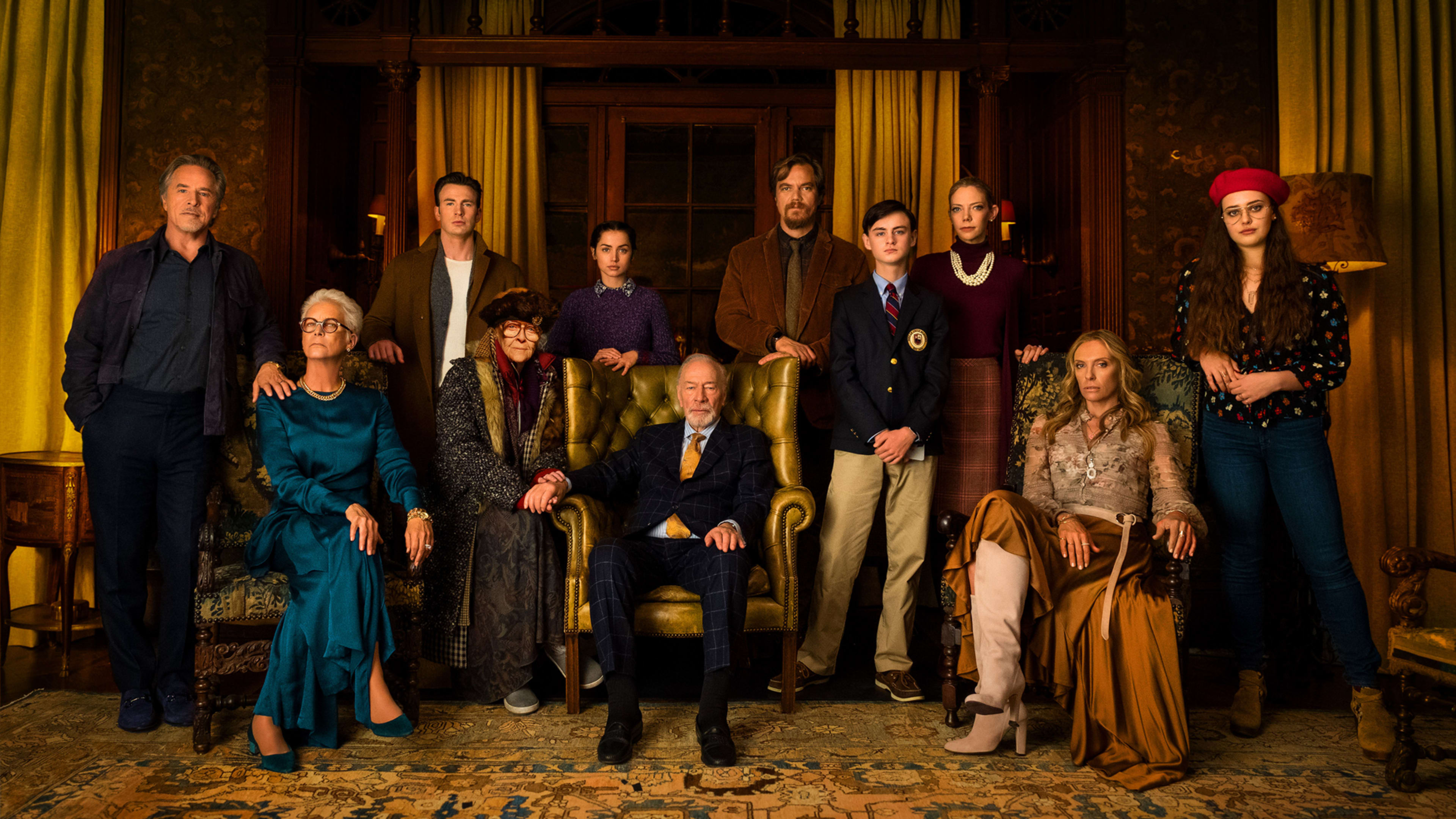No matter how contentious a Thanksgiving you’re dreading this week, odds are that it won’t come within turkey-tossing distance of the familial turmoil depicted in Knives Out, which is in theaters today.
The new film, written and directed by The Last Jedi’s Rian Johnson, is a madcap whodunnit set just after the suspicious suicide of a hugely successful author (Christopher Plummer). The deceased’s extended family has big plans for how each will spend his fortune . . . until they learn he’s left it all to Marta (Ana de Armas), his young, Latina immigrant caretaker.
For all the heated finger-pointing and fireworks that follow, the real fight the film explores is the perennially simmering class war that lately feels as though it’s risen to a boil.
Knives Out, though, is only the most recent genre film this year to dip in a thermometer.
“There’s something in the air,” Rian Johnson says, in a phone interview, about all the 2019 filmmakers with inequality on the brain.
The most immediately striking thing about this crop of genre movies—all of which embed class issues in popcorn-friendly packaging—is their variety. Knives Out is a detective-flick descendent of such Agatha Christie mysteries as Murder on the Orient Express. Us is a mind-bending horror parable in the socially conscious mold of director Jordan Peele’s previous hit, Get Out. Joker is a lab-cloned ’70s Scorsese movie masquerading as a DC comic book blockbuster. South Korean director Bong Joon-Ho’s masterpiece, Parasite, is ultimately a thriller, though it defies easy labeling. Hustlers is a heist movie about gender and control: As I wrote in September about the film, “The concept of control, and the mystery of who’s controlling whom, vibrates on the screen in practically every scene.” Ready or Not is a bloody horror romp that shares its Most Dangerous Game-style conceit with The Hunt, a film that was supposed to be released in 2019 but was shelved indefinitely after Trump supporters objected to its trailer.
The plotline and style of each film couldn’t be more different from the others, but what they all share is a warning to the 1%: In one way or another, a day of reckoning is coming. (Though the other 99% don’t all get off scot-free either.)
Why now? We’ll give you one guess
It must mean something that these films were all released in 2019. (Sorry, The Hunt!) Instead of hitting screens in 2018 or 2020, they all came out the same year that income inequality in the U.S. hit its highest level in the five decades since the U.S. Census bureau started measuring it. Or perhaps the role billionaires have played in the forthcoming presidential race. Between those who are running (Tom Steyer, Michael Bloomberg), those who flirted with it for months (Howard Schultz), the ostensible billionaire currently running for re-election, and those candidates running who have made clear that they’ll be soaking those billionaires if elected, the concepts of privilege and deserving have taken up a residency at the forefront of culture in 2019. People want to talk about it and want to hear about it and don’t necessarily want to go to the cineplex to escape it. In fact, one of the only major criticisms of Booksmart, a teen comedy billed as the female answer to Superbad, is that the incredible privilege enabling all the students we meet to attend any college of their choosing goes completely unremarked upon in any meaningful way.
So even though it may be a scheduling coincidence that all these movies came out this year, it doesn’t feel like it.

When I ask Johnson what changed between taking the Star Wars job in 2014 and sitting down to write Knives Out in early 2018 that may have influenced the latter, he deadpans: “I can think of one big event.”
Despite having been in the works for a long time, Knives Out is an urgently of-the-moment film, due in no small part to the fact that Johnson wrote the screenplay quickly in order to keep the production on schedule. As a result, it’s the only genre movie this year that definitively takes place in the universe and era in which Donald Trump is president. All the other class-minded genre films this year are either period pieces like Joker, with its grimy early-’80s “Gotham” milieu, Hustlers, which spans from the mid-aughts to 2014, or contemporary fare that avoids directly addressing whom may have delivered which tax cuts where recently.
“I just thought, ‘We’re just going to put this in, we’re not going to be subtle,'” Johnson says. “When the family has a few glasses of wine, they’re going to argue about what we’re arguing about right now with our families. I didn’t want it to feel like the movie is wagging its finger at you, but I wanted it to engage with the culture right now.”

Class struggle is timeless
While the political bickering in Knives Out should feel au courant, the struggle the film illustrates is timeless. In order for the Thrombey family to maintain its extravagant wealth, its members seek to deny the fortune coming to the working-class immigrant who stands to inherit it. Just as in real life, the 1% has a vested interest in maintaining the status quo at all costs—along with the resources to stack the deck. But there are lots of ways of showing that entrenched wealth is much easier to maintain than it is for blue-collar workers just to survive. In Joker, social services lose the funding to medicate and provide therapy for destitute, disturbed Arthur Fleck (Joaquin Phoenix), while the industrialist Thomas Wayne (Bruce’s dad) thrives in his gated compound. Like the wealthy Park family in Parasite, who are conned into hiring a family of poor impostors to work in their home, Wayne isn’t painted as a villain, just aloof and contemptuous of the hordes hurting beneath him. Neither seems to have any concerns over the fact that what’s hurting those hordes is what enables them to maintain their station.
In Us, Jordan Peele literalizes the divide, giving each American a subterranean doppelganger they unwittingly control. The “tethered” souls underground have no choice but to attempt to mimic whatever their topside counterparts are doing, often to their detriment. All that seems to separate one from the other, as far as the viewer understands, is which side of the ground they happen to have been born on.
As Peele said in an interview with Slash Film earlier this year, “The idea that part of having privilege, especially in this country, seems to be that we don’t consider it unearned. We have this legacy culture where we don’t acknowledge the people who have and do suffer for us to have the things that we take for granted. I think when you look in this movie in terms of nationality, which is certainly my jumping off point, or class, or race, or haves/have-nots, however you look at this movie, the common factor to me is that the haves feel like we deserve. And we confuse the idea of privilege and deserving.”
Bong Joon-Ho, whose Snowpiercer (2014) is an action-packed allegory about the wealth gap, amplified Peele’s observations in an October interview with GQ. “I think all creators, all artists, and even just everyone, we are always interested in class, 24/7,” he said. “I think it would actually be strange if we’re not. You know, when we’re seeing people on the subway, on the streets, complete strangers, we wonder, how rich are they? Or you know, people we encounter in the airports, did they ride economy class, business class? We always wonder about this, because we live in the era of capitalism. I think we all have a very sensitive antennae to class, in general.”

Playing with perspective
For Johnson, the murder-mystery genre felt like a good fit for his own take on these issues. “I think murder mysteries have always been particularly adept at looking at class divisions in any society,” he says. “Usually we see it in the context of Britain, because murder mysteries are often Agatha Christie adaptations. But there’s something about the spectrum of suspects who usually run the gamut from the high to the low that’s just really adept at speaking to class, and you saw that with Gosford Park. I thought it felt very electric, the notion of using this genre to plug into some very current stuff about America.”
Knives Out wades into these waters with a diverse group of characters who are all suspects and members of the family. As such, the film allows us to view the idea of Marta inheriting the family fortune from several perspectives. This is key to building depth into a class-conscious film. In Parasite, we meet the wealthy Park family, who live in a gorgeous house designed by a famous architect, through the eyes of the Kim family, who live in a crowded sub-basement apartment. Once the Kims have scammed their way into working for the Park family, we see the Kims both as the Parks think they see them, and occasionally as they reveal their true selves. Similarly, a perspective shift near the end of Us calls into question everything we’ve seen until that point. In Joker, we finally get to see the cityscape of Gotham as one of the denizens it failed does, rather than a zillionaire industrialist who smacks around desperate criminals by moonlight. We don’t have to take his side, but it makes a difference just to see his side. Seeing is believing.
Under the knife
One viewpoint Johnson wanted to make sure was represented in Knives Out was his own—and not necessarily in a flattering way.
“It was very important for me—if I was going to get into the human stuff that’s actually behind what’s going on today—that I self-indict as much as anything else. As someone who is basically a Hollywood liberal, I needed to put myself up on the screen and show my own feelings just as much as anyone else. Audiences can smell when they’re being lectured to and condescended to, and audiences can smell when you’re actually laying something out there.”
In the movie, even the most well-intentioned, liberal-leaning characters can’t seem to remember from which country Marta emigrated. It’s a small detail, but it signifies that some of these people may enjoy patting themselves on the back for their progressive views rather than actually putting those views into action. It’s as much a commentary on Johnson as his characters.
Perhaps what these films all want, more than anything else, is for us all to come, knives out, for ourselves.
Recognize your brand’s excellence by applying to this year’s Brands That Matter Awards before the early-rate deadline, May 3.
